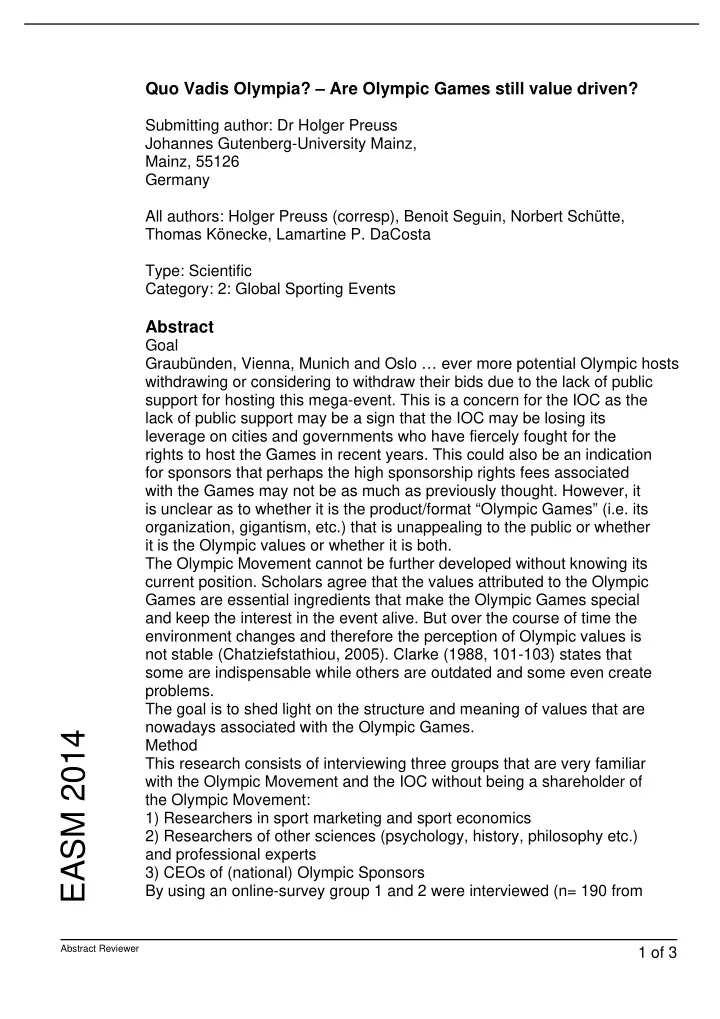

Quo Vadis Olympia? – Are Olympic Games still value driven? Submitting author: Dr Holger Preuss Johannes Gutenberg-University Mainz, Mainz, 55126 Germany All authors: Holger Preuss (corresp), Benoit Seguin, Norbert Schütte, Thomas Könecke, Lamartine P. DaCosta Type: Scientific Category: 2: Global Sporting Events Abstract Goal� Graubünden, Vienna, Munich and Oslo … ever more potential Olympic hosts withdrawing or considering to withdraw their bids due to the lack of public support for hosting this mega-event. This is a concern for the IOC as the lack of public support may be a sign that the IOC may be losing its leverage on cities and governments who have fiercely fought for the rights to host the Games in recent years. This could also be an indication for sponsors that perhaps the high sponsorship rights fees associated with the Games may not be as much as previously thought. However, it is unclear as to whether it is the product/format “Olympic Games” (i.e. its organization, gigantism, etc.) that is unappealing to the public or whether it is the Olympic values or whether it is both.� The Olympic Movement cannot be further developed without knowing its current position. Scholars agree that the values attributed to the Olympic Games are essential ingredients that make the Olympic Games special and keep the interest in the event alive. But over the course of time the environment changes and therefore the perception of Olympic values is not stable (Chatziefstathiou, 2005). Clarke (1988, 101-103) states that some are indispensable while others are outdated and some even create problems.� The goal is to shed light on the structure and meaning of values that are nowadays associated with the Olympic Games.� EASM 2014 Method� This research consists of interviewing three groups that are very familiar with the Olympic Movement and the IOC without being a shareholder of the Olympic Movement: � 1)�Researchers in sport marketing and sport economics� 2)�Researchers of other sciences (psychology, history, philosophy etc.) and professional experts� 3)�CEOs of (national) Olympic Sponsors � By using an online-survey group 1 and 2 were interviewed (n= 190 from Abstract Reviewer 1 of 3
46 countries; completed in February 2014). Group 3 will get a very similar questionnaire in April 2014 (min. target n = 20 from 2 countries).� The main hypotheses are that the high ranking officials from Olympic Sponsors may see the Olympic Games and its values different that those scholars related to economics. However both groups are expected to perceive the values at least other than those not being scholars in the economic field. We asked aided and unaided recall of Olympic Values in order to investigate which values are known as well as what importance they have for the current Movement. In order to detect current economic related problems (corruption, gigantism, commercialization etc.) in the Olympic Movement we asked all groups for ideas to be considered by the IOC in future to strengthen the Olympic Movement. � Results� The analysis of the data from group 1 and group 2 yielded results concerning values related to the Games and the Olympic Idea as well as the current situation of the Olympic Movement. Interviewees had to put the Olympic Movement in a product life cycle in order to see how they think about the future development of the Olympic Movement. Overall we display the difference perception of Olympic Values from the different socialized groups. � Some findings looking at group 1 and 2 are: � 1.�Today 15% of the scholars/experts feel negatively about the Olympic Games in general, when taking all relevant aspects into consideration.� 2.�Many of the scholars/experts feeling positively about the Olympic Games or of those seeing the development of the Games in an up-swing mainly mention a) peace, b) friendship and c) internationalism as important Olympic values. Those feeling the Games are negative and/or are in a down-swing mention a) mutual understanding, b) discipline/ determination, c) inclusion and d) competition more often.� The Scholars/experts have several suggestions to the IOC on how to keep the Olympic Movement constantly successful. The suggestions tackle a variety of issues. Many of them are indirectly related to the Olympic values. The majority feels that the IOC should put more focus on keeping the Olympic values associated with the Games. Along with that, the scholars want “good governance” at the IOC, which is related to transparency, democracy and anti-corruption. This is followed by two practical recommendations: One is to fight against commercialization and the other is to reduce gigantism. Interestingly, the change of the sport EASM 2014 program is not really recommended often.� At the conference the results from all three groups will be shown. References Chatziefstathiou, D. (2005). The Changing Nature of the Ideology of Olympism in the Modern Olympic Era. Theses published at http://library.la84.org/SportsLibrary/Books/IdeologyOfOlympism.pdf.� Clarke, K. (1988). – Immutable Values and Principles and Outdated Factors, 28th Young Participants Session, International Olympic Abstract Reviewer 2 of 3
Academy, pp. 99-104. EASM 2014 Abstract Reviewer 3 of 3
Recommend
More recommend